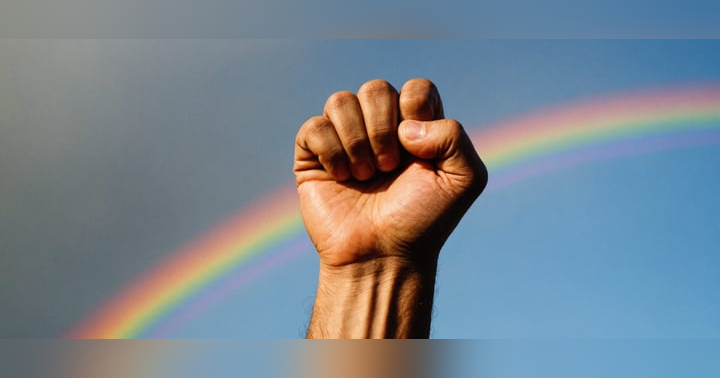Allyship Check: Are You Showing Up for the LGBTQ+ Community?

“An Ally Doesn’t Take Breaks"
In today’s social and political climate, allyship for the LGBTQ+ community is more critical than ever. While progress has been made—such as the legalization of same-sex marriage in 2015 and increased LGBTQ+ visibility—these milestones only scratch the surface of true equality. Discrimination, systemic barriers, and violence against LGBTQ+ individuals continue to persist, making it essential for allies to take an active role in advocating for change.
Greg Baird, a professional lecturer on LGBTQ+ civil rights, has dedicated more than three decades to education and activism. Reflecting on his early experiences growing up in a small town marked by bigotry, he emphasizes that allyship is about more than just being supportive—it requires action. "An ally doesn’t take breaks," Greg asserts, stressing the need for ongoing engagement, advocacy, and education.
Moving Beyond Performative Support
Allyship is more than symbolic gestures. Displaying a Pride flag, attending a parade, or posting on social media during Pride Month can signal support, but these actions fall short if they are not backed by consistent advocacy. True allyship requires year-round commitment, confronting biases, and using privilege to amplify LGBTQ+ voices.
Baird highlights the importance of personal accountability in dismantling biases, urging individuals to recognize how societal conditioning influences their perceptions of LGBTQ+ people. “We need to share our stories,” he explains. “Our stories change hearts and minds and policies. We find out that we're more alike than we are different, but then the difference does not need to be something that's negative. Our differences need to be celebrated.”
Allyship in Workplaces and Communities
The workplace offers a crucial platform for allies to foster inclusivity. However, true inclusion extends beyond hiring LGBTQ+ employees—it involves ensuring equal opportunities for advancement, amplifying LGBTQ+ voices, and fostering a culture where everyone feels valued.
Greg encourages employees to continue fostering inclusivity even when formal diversity, equity, and inclusion (DEI) programs are reduced or eliminated. “We need to come together,” he says. “If those DEI programs are no longer in your workplace, you still can get together with your colleagues… Employees need to show up for one another in solidarity.”
Beyond professional settings, allies can contribute to change in everyday interactions. Attending LGBTQ+ events, supporting queer-owned businesses, and engaging in meaningful conversations help break down barriers and create safer spaces for LGBTQ+ individuals.
Small Actions, Big Impact
Allyship doesn’t always require grand public gestures. Small, everyday actions can have a significant impact. Whether it’s wearing a shirt with a message of support, sharing educational resources, or standing up against discriminatory remarks, these acts contribute to a more inclusive society.
Encouraging open dialogue between LGBTQ+ individuals and allies is also essential. Watching LGBTQ+ films, attending lectures, and engaging in discussions provide valuable opportunities to learn and grow. By taking these steps, allies help normalize inclusivity and challenge harmful biases.
Protecting Peace in the Face of Adversity
LGBTQ+ individuals continue to face discrimination, hate, and systemic challenges. While the fight for equality can be exhausting, protecting mental and emotional well-being remains crucial. Greg reminds allies and LGBTQ+ individuals alike to be mindful of how negativity affects them. “Hate is out there. How you ingest all that in going forward, you can shake your head. You can be mad about it. It can ruin your day. Don't let it do that. Protect your peace.”
Staying committed to allyship, even when progress feels slow, is essential. Change often happens incrementally, and allies must be willing to advocate for LGBTQ+ rights even in the face of opposition. By consistently showing up, allies help create environments where LGBTQ+ individuals feel seen, heard, and supported.
The Responsibility of True Allyship
Allyship is not a temporary commitment or a seasonal celebration—it is a continuous effort toward equality and justice. While progress has been made, LGBTQ+ individuals still face legal, social, and workplace discrimination. True allyship demands more than momentary engagement; it requires taking an active stance against injustices and pushing for systemic change.
Greg reinforces the necessity of unwavering support: "An ally doesn’t take breaks, and an ally should call things out if they don’t seem right." This means challenging discriminatory policies, educating oneself and others, and prioritizing meaningful action over performative gestures.
A genuine ally is someone who shows up consistently, not just when it’s convenient. Whether advocating for LGBTQ+ rights in the workplace, supporting friends and colleagues, or educating others, every action—big or small—helps build a more inclusive and just society.
Not every relationship—personal, professional, or corporate—will last, and some will falter when challenged to move beyond performative allyship. In these moments, it’s essential to reassess where energy is best spent. True progress comes from aligning with those committed to equality, fostering a stronger, more supportive community driven by lasting, meaningful action.
And remember: every day is all we have, so you've got to make your own happiness.
For more information on this topic, listen to Episode 140. Calling All Allies: It’s Time to Step Up (with Greg Baird).
Tune into your favorite podcast player every Tuesday for new episodes of A Jaded Gay.


















